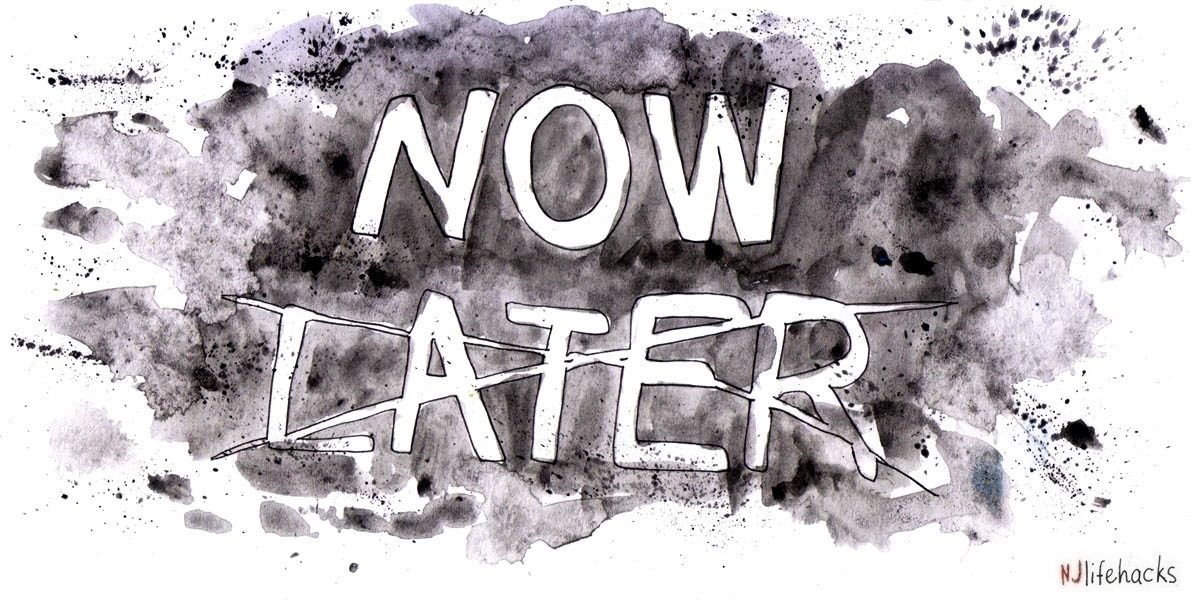Why We Delay? Understanding and Overcoming Procrastination

Procrastination is a fascinating and complex behavior that many of us grapple with daily. It's that nagging feeling that tells us to delay a task, even when we know it's in our best interest to get it done.
But why do we do it? Let's dive deep into the psychology and causes of procrastination.
The Psychology Behind Procrastination
At its core, procrastination is the act of unnecessarily postponing decisions or actions. You've probably experienced this when you've delayed starting an assignment until the eleventh hour, even though you knew it would have been better to start earlier.
It's a perplexing behavior, especially when we're aware of the negative consequences yet continue to do it.
But what's happening in our minds that leads us to delay?
Let's delve deeper into the psychological mechanisms behind procrastination.
The Battle of Drives: Act vs. Delay

At the heart of procrastination lies a tug of war between two primary drives: the drive to act and the drive to delay.
The balance between these drives determines whether we take action or postpone it.
Drive to Act:
- Definition: This is the inherent motivation or push that propels us to take immediate action. It's the voice inside us that says, "Do it now!"
- Influenced by Self-Control: Self-control is our ability to regulate our emotions, thoughts, and behaviors in the face of temptations and impulses. A strong sense of self-control enables us to push through distractions and stay focused on the task at hand. However, this self-control can be depleted, especially after a long day or during moments of stress.
- Influenced by Motivation: Motivation is the reason or reasons one has for acting or behaving in a particular way. It's the driving force behind our actions. The perceived value or reward of completing a task can significantly boost our motivation. For instance, the prospect of getting a promotion might motivate an employee to finish a project ahead of schedule.
- Factors that Weaken the Drive to Act: Fatigue, lack of clear rewards, distractions, and overwhelming tasks can all diminish our drive to act. For example, even simple tasks can seem daunting after a sleepless night.
Drive to Delay:
- Definition: This is the pull that encourages us to postpone tasks. It's the voice that whispers, "It can wait."
- Desire to Avoid Negative Emotions: One of the primary reasons people delay tasks is to avoid the negative emotions associated with them. For instance, someone might put off making a difficult phone call because they fear confrontation or negative feedback.
- Seeking Short-Term Pleasure: The human brain is wired to seek immediate rewards. This can manifest as choosing to watch a TV show instead of working on a report. The immediate pleasure of entertainment often outweighs the long-term benefit of completing work.
- Giving in to Feel Good: This behavior is about choosing immediate comfort over long-term benefits. It's the decision to eat that slice of cake now, even if it means straying from a diet.
- Role of Anxiety and Perfectionism: Anxiety can stem from the fear of not doing a task perfectly or the potential consequences of failure. Perfectionists, in particular, might delay starting a task because they fear they won't be able to complete it to their high standards. They might think, "If I can't do it perfectly, why start at all?"
By understanding these underlying mechanisms, we can develop strategies to strengthen our drive to act and mitigate the factors that push us to delay.
Whether it's finding the right motivation, addressing our fears, or simply restructuring our environment, there are ways to overcome the procrastination hurdle.
Common Reasons for Procrastination
- Prioritization of Short-Term Mood: Choosing immediate pleasure over long-term benefits.
- Task Aversiveness: Perceiving a task as unpleasant or boring.
- Anxiety and Fear: Concerns about failure or criticism.
- Feeling Overwhelmed: Uncertainty about where to start.
- Perfectionism: Unwillingness to accept any flaws in work.
- Disconnect from Future Self: Viewing future consequences as someone else's problem.
- Delayed Outcomes: Valuing immediate rewards over future ones.
- Low Motivation: Not seeing the value in the outcome.
- Expected Effort: Anticipating a task will be hard.
- Inertia: The tendency to maintain the status quo.
- Abstract Goals: Goals that aren't clearly defined.
- Cognitive Biases: Being overly pessimistic or optimistic about outcomes.
- Time-Management Issues: Not prioritizing tasks effectively.
- Problematic Traits: Impulsivity and distractibility.
- Underlying Conditions: Conditions like depression or ADHD.
- Low Energy: Feeling physically or mentally drained.
- Problematic Environment: Being in a distracting setting.
Overcoming Procrastination

Overcoming it requires understanding, strategy, and consistent effort.Let's delve deeper into the strategies to combat this behavior.
1. Set Specific Goals:
- Why It's Important: Having vague or ambiguous goals can lead to confusion and lack of direction, making it easier to put things off. Specific goals provide clarity and a sense of purpose.
- SMART Goals: Use the SMART criteria - Specific, Measurable, Achievable, Relevant, and Time-bound. For instance, instead of saying "I want to get fit," say "I want to run 5 kilometers in 30 minutes within the next three months."
- Visualize the End Result: Imagine the satisfaction and benefits of achieving your goal. This can serve as a powerful motivator.
2. Assess Your Procrastination Patterns:
- Self-Reflection: Take a step back and analyze your behavior. When are you most likely to procrastinate? Is it in the morning, afternoon, or night? Is it when faced with a particular type of task?
- Identify Triggers: Recognize the emotional or environmental triggers that lead to procrastination. It could be fear of failure, perfectionism, or even a noisy environment.
- Maintain a Procrastination Journal: Document instances when you procrastinate. Note down the task, the reason for delay, the emotion you felt, and the eventual outcome. Over time, you'll see patterns emerge.
3. Create an Action Plan:
- Prioritize Tasks: List tasks in order of importance. Tackling high-priority tasks first can give you a sense of accomplishment, motivating you to take on subsequent tasks.
- Break Tasks into Manageable Chunks: Large tasks can feel overwhelming. Breaking them down into smaller steps makes them more approachable.
- Use Anti-Procrastination Techniques: Depending on your triggers, employ techniques like the "Pomodoro Technique" for time management, "Two-Minute Rule" for quick tasks, or "Fear-Setting" to address anxieties.
- Set Deadlines: Even if one doesn't exist, creating a self-imposed deadline can create a sense of urgency.
4. Implement Your Plan:
- Commit Publicly: Sharing your goals with friends or family can create a sense of accountability.
- Regularly Review: What's working? What's not? Adjust your strategies based on your progress.
- Celebrate Small Wins: Every task you complete is a step closer to your goal. Celebrate these achievements, no matter how small. It boosts morale and motivation.
- Stay Patient and Persistent: Overcoming procrastination is a journey, not a destination. There will be setbacks, but with persistence, you can build better habits over time.
Reflection
To truly overcome procrastination, it's essential to reflect on your behavior:
- What are the primary reasons you delay tasks?
- Are there specific triggers that lead to procrastination?
- How has procrastination impacted your past goals and productivity?
- What actionable steps can you take to combat procrastination?
- How will you stay motivated and accountable in the future?
Understanding the psychology behind procrastination is the first step to overcoming it. By recognizing the reasons we delay tasks and implementing strategies to combat these triggers, we can become more productive and achieve our goals.
Remember, the journey to overcoming procrastination is a continuous one, but with reflection and action, you can make significant strides.